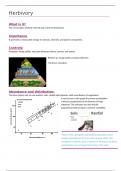Herbivory - Study guides, Class notes & Summaries
Looking for the best study guides, study notes and summaries about Herbivory? On this page you'll find 135 study documents about Herbivory.
Page 2 out of 135 results
Sort by
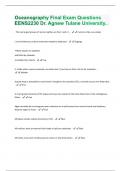
-
Oceanography Final Exam Questions EENS2230 Dr. Agnew Tulane University Questions And Answers Rated A+
- Exam (elaborations) • 16 pages • 2024
- Available in package deal
-
- $7.99
- + learn more
. The two largest groups of marine reptiles are the ( ) and ( ) . - marine turtles, sea snakes ( ) are Herbivorous marine mammals related to elephants - dugongs • More people are attacked and killed by saltwater crocodiles than sharks - true 5. Unlike other marine mammals, sea otters lack ( ) and rely on their rich fur for insulation. - blubber A great drop in atmospheric ozone levels, thought to be caused by CFCs, currently occurs over Antarctica. - true A much greater diversity of f...
![[UCSB] EEMB 2 - Midterm 1 Updated 2024/2025 with complete solutions](/docpics/5879020/66a1419d28738_5879020_121_171.jpeg)
-
[UCSB] EEMB 2 - Midterm 1 Updated 2024/2025 with complete solutions
- Exam (elaborations) • 19 pages • 2024
- Available in package deal
-
- $7.99
- + learn more
Age structure - Distribution of individuals across age categories Alfred Russel Wallace - Established biogeography Amenalism - One species is harmed, other is unaffected Antagonistic interactions - One species benefits, other is harmed (e.g., predation, herbivory, parasitism) Any environment is made up of its ________________ and ________________ components. - Biotic and abiotic Aposematism - 'Warning' coloration Are abiotic factors generally density-dependent or -independent? - Densit...
A summary and study version of the lecture covering herbivory in BOT251, printable with all necessary information for exam purposes.
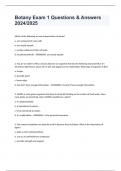
-
Botany Exam 1 Questions & Answers 2024/2025
- Exam (elaborations) • 12 pages • 2024
- Available in package deal
-
- $8.99
- + learn more
Botany Exam 1 Questions & Answers 2024/2025 Which of the following are not characteristics of plants? a. are composed of many cells b. are mostly aquatic c. contain cellulose in their cell walls d. are photosynthetic - ANSWERSb. are mostly aquatic 2. You are on safari in Africa and you discover an organism that has the following characteristics: it's terrestrial, light brown, about 10 cm tall, and appears to be multicellular. What type of organism is this? a. fungus b. parasitic...
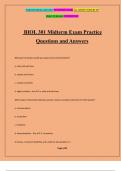
-
BIOL 301 Midterm Exam Practice Questions and Answers
- Exam (elaborations) • 28 pages • 2024
-
- $11.49
- + learn more
BIOL 301 Midterm Exam Practice Questions and Answers What pair of species would you expect to be commensalism? a. owls and oak trees b. osprey and herons c. coyotes and foxes d. algae and kelp - Ans:-a. owls and oak trees Which type of interaction between species results in positive outcomes for both species? a. commensalism b. mutualism c. herbivory d. heterotrophism - Ans:-b. mutualism A moose, a monarch butterfly, and a wolf are all examples of ... ©GRACEAMELIA 2024/2025 ACADEMI...
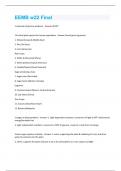
-
EEMB w22 Final New Update 2024 Actual Test with complete solution
- Exam (elaborations) • 27 pages • 2024
- Available in package deal
-
- $7.99
- + learn more
1 molecule of glucose produces - Answer-36 ATP 12 critical plant species for human population - Answer-Cereal grains (grasses): 1. Wheat (Europe & Middle East) 2. Rice (Far East) 3. Corn (Americas) Root crops: 4. White (Irish) potato (Peru) 5. Sweet potato (tropical Americas) 6. Casaba/Tapioca (South America) Sugar producing crops: 7. Sugar cane (East India) 8. Sugar beets (Western Europe) Legumes: 9. Common beans (Mexico, Central America) 10. Soy beans (China) Tree Crops: 11. Co...
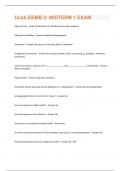
-
Ucsb EEMB 2: MIDTERM 1 EXAM QUESTIONS & ANSWERS RATED 100% CORRECT!!
- Exam (elaborations) • 19 pages • 2024
- Available in package deal
-
- $7.99
- + learn more
Age structure - Answer-Distribution of individuals across age categories Alfred Russel Wallace - Answer-Established biogeography Amenalism - Answer-One species is harmed, other is unaffected Antagonistic interactions - Answer-One species benefits, other is harmed (e.g., predation, herbivory, parasitism) Any environment is made up of its ________________ and ________________ components. - AnswerBiotic and abiotic Aposematism - Answer-'Warning' coloration Are abiotic factors generally den...
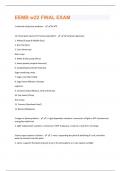
-
EEMB w22 FINAL EXAM QUESTIONS & ANSWERS RATED 100% CORRECT!!
- Exam (elaborations) • 28 pages • 2024
- Available in package deal
-
- $7.99
- + learn more
1 molecule of glucose produces - 36 ATP 12 critical plant species for human population - Cereal grains (grasses): 1. Wheat (Europe & Middle East) 2. Rice (Far East) 3. Corn (Americas) Root crops: 4. White (Irish) potato (Peru) 5. Sweet potato (tropical Americas) 6. Casaba/Tapioca (South America) Sugar producing crops: 7. Sugar cane (East India) 8. Sugar beets (Western Europe) Legumes: 9. Common beans (Mexico, Central America) 10. Soy beans (China) Tree Crops: 11. Coconut (Southea...
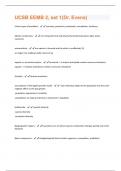
-
UCSB EEMB 2, set 1(Dr. Evens) Questions And Answers With Verified Solutions Graded A+
- Exam (elaborations) • 8 pages • 2024
- Available in package deal
-
- $7.99
- + learn more
5 basic types of predation - carnivory, parasitism, parasitoids, cannabalism, herbivory Abiotic components - non-living chemical and physical factors(temperature, light, water, nutrients) ammensalism - one species is harmed and the other is unaffected(-,0) ex: larger tree shading smaller stature tree aquatic vs. terrestrial systems - terrestrial--> 3 trophic levels(odd number=resource limitation) aquatic--> 4 trophic levels(even number=consumer limitation) Aristotle - Historia anima...
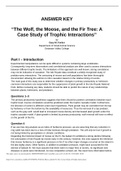
-
The Wolf, the Moose, and the Fir Tree: A Case Study of Trophic Interactions
- Exam (elaborations) • 5 pages • 2023
-
- $7.99
- 1x sold
- + learn more
ANSWER KEY “The Wolf, the Moose, and the Fir Tree: A Case Study of Trophic Interactions” by Gary M. Fortier Department of Small Animal Science Delaware Valley College Part I – Introduction Experimental manipulations can be quite difficult in systems containing large vertebrates. Consequently, long-term observations and correlational analysis are often used to assess interactions between different trophic levels. The limitations of this approach are well known; strong correlations...

That summary you just bought made someone very happy. Also get paid weekly? Sell your study resources on Stuvia! Discover all about earning on Stuvia

